By Wang Ming-meng
Edited and translated by Wu Hsiao-ting
Photos by Huang Xiao-zhe
From his work in rural Taiwan to international conferences, Vice-Superintendent Dr. Lin Ming-nan of Dalin Tzu Chi Hospital embodies a deep commitment to preventive medicine and environmental stewardship.
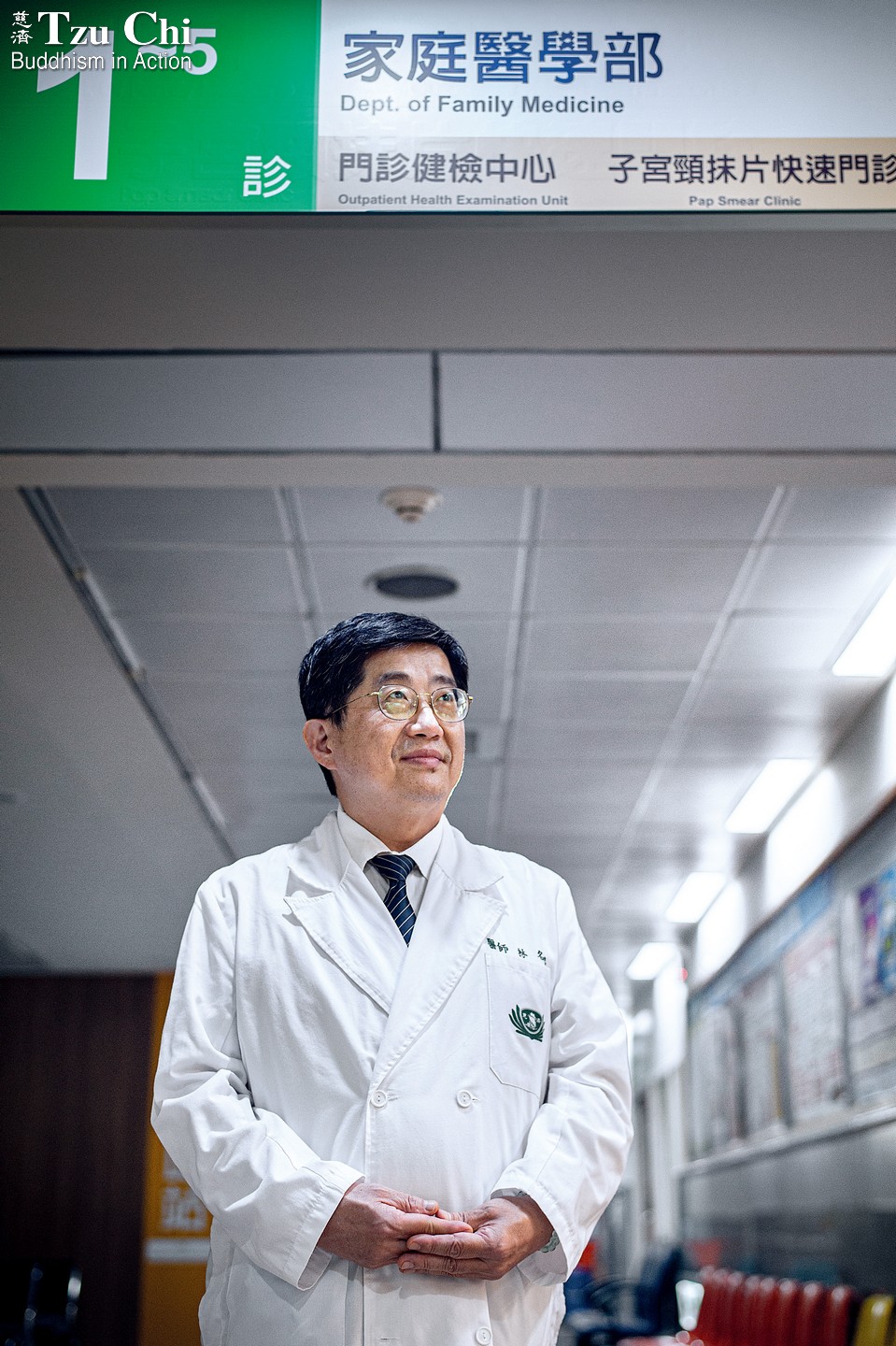
“
Get a thoracotomy kit from the OR!” barked the attending physician, his voice filled with urgency as he fought to save the gravely wounded patient on the ER gurney.
Lin Ming-nan (林名男) and another intern were standing nearby, staring wide-eyed at the young man on the gurney, brutally stabbed in the back with a large chisel. He was barely registering a blood pressure.
Once the thoracotomy kit was brought in, the attending physician expertly used the rib spreader to open the patient’s rib cage, but no blood spurted out; the patient had already lost too much. Faced with both a collapsed lung and internal bleeding, the doctor immediately initiated a transfusion of four units of blood. He inserted a transfusion line and squeezed a blood bag while ordering, “Intern, start compressions!” Lin Ming-nan began internal cardiac massage on the patient, whose heart had stopped by this point.
The dramatic scene above transpired in 1989, the third year of operation for Hualien Tzu Chi Hospital in eastern Taiwan. Lin Ming-nan, a medical student about to enter his seventh year at National Taiwan University (NTU), northern Taiwan, was interning at the hospital as part of a collaboration program between NTU Hospital and Hualien Tzu Chi Hospital. At 23 years of age and only a week into his internship, he was thrown into the crucible of a life-and-death struggle.
Despite the medical team’s best efforts, the severely wounded young man ultimately succumbed to his injuries. But then something remarkable occurred: instead of blaming the team, the man’s family showed understanding and expressed gratitude for the team’s selfless dedication in their valiant fight to save their loved one. This incident left a deep impression on Lin: “A good doctor will never give up on a patient without a fight; he will treat them as family and do everything possible to save them until the very end.”
A doctor’s journey
Lin Ming-nan was born in 1965 in Jiali Township, southern Taiwan. The simplicity of rural life shaped his gentle and kind nature. In high school, he was captivated by the mysteries of life after reading a college biology textbook recommended by his teacher. This prompted him to set his sights on medical school. His desire to care for remote rural communities led him to choose family medicine. Having grown up in a rural area, he understood the urgent need for health education and medical care in such communities.
After being admitted to NTU’s College of Medicine, Lin joined and became involved in a service club. His experiences leading summer and winter camps for underserved communities influenced his decision to serve in the rural Pingxi Township, northern Taiwan, after completing his residency training.
Following his graduation from medical school and then a three-year residency in family medicine, he began working at the public health center in Pingxi. At the time, in 1995, he was the only doctor in Pingxi, providing care to 6,685 registered residents. To ease access to care, he not only saw patients in the clinic but also made house calls.
Lin dedicated himself fully to his work but sometimes felt frustrated and powerless. He deeply sympathized with the elderly villagers suffering from pneumoconiosis, a result of their past work as coal miners. Many of these patients couldn’t or wouldn’t pay 50,000 Taiwanese dollars (US$1,670) for an oxygen concentrator to ease their suffering, making the end of their lives difficult and painful.
Determined to make a difference, he dedicated a significant amount of his time to health education, earnestly advising these patients to keep an oxygen tank at home. With the help of his wife, Chu qiu-hua (褚秋華), a social worker, he collected nearly 20 medical oxygen concentrators to assist patients with end-stage pneumoconiosis.
His three years of experience in Pingxi steered him toward health promotion. But the seeds for his lifelong commitment to this field really were sown during his fifth year of medical school, when his professor highlighted that while Taiwan had no shortage of clinicians treating patients, there was a lack of doctors focused on preventive medicine and health promotion.
Lin’s father was diagnosed with terminal lung cancer during Lin’s graduate studies in preventive medicine at NTU. Despite his professor’s advice to stay in school, Lin returned home to care for his father. Sadly, the cancer spread to his brain and he passed away at the age of 58. During this period, Lin worked at Sinlau Christian Hospital and served as the director of the hospital’s Community Health Center, fulfilling his wish to care for his fellow townspeople.
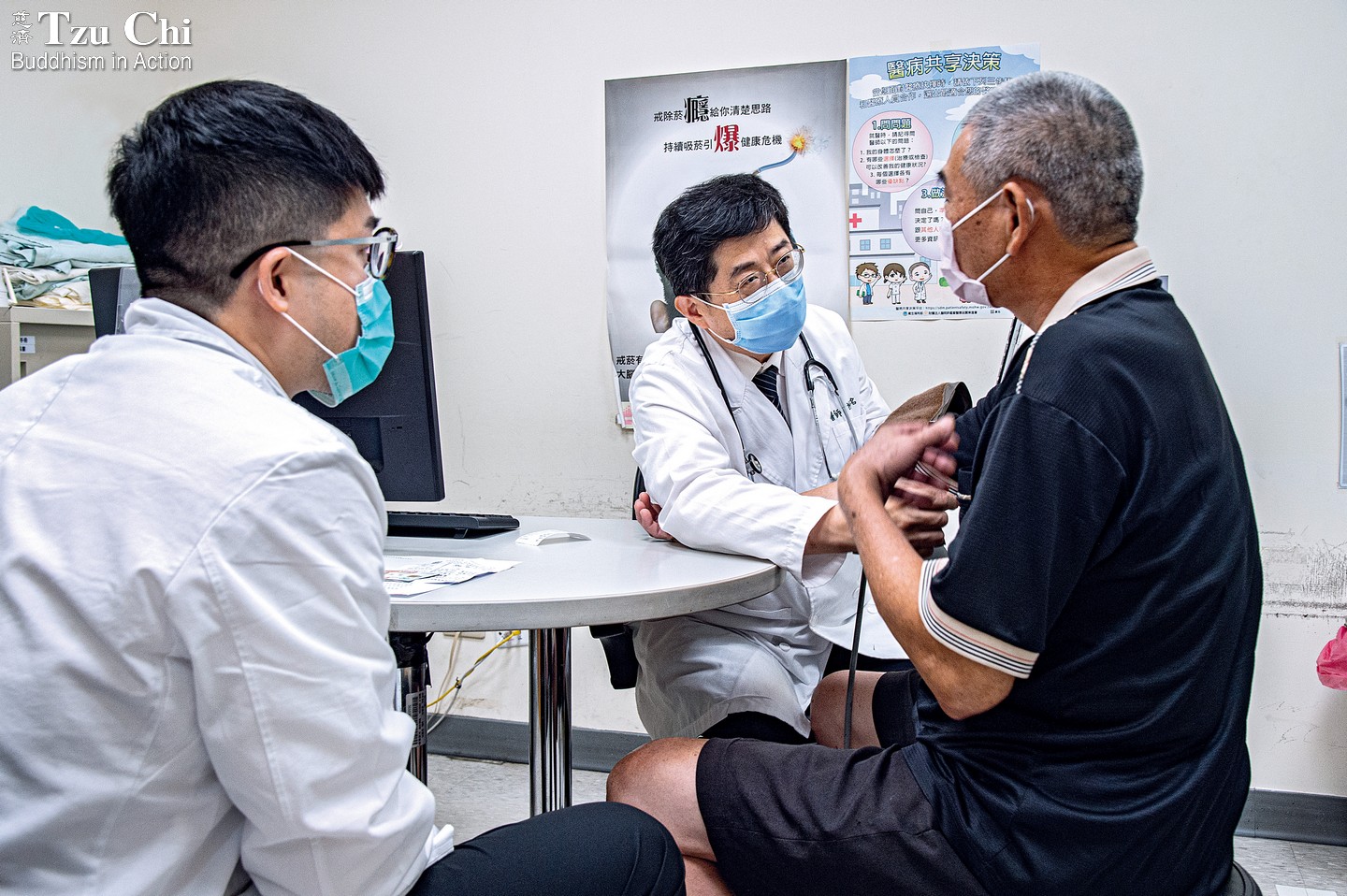
Dr. Lin Ming-nan conducts a patient examination with an intern observing. Lin treats patients with warmth and generously mentors intern doctors.
Joining Tzu Chi
In 2005, with the support of his family, Lin Ming-nan began his career at Dalin Tzu Chi Hospital in Chiayi, southern Taiwan. But his connection to Tzu Chi began even before his internship at Hualien Tzu Chi Hospital. In the 1980s, when the hospital was under construction, a Tzu Chi volunteer who was a neighbor approached Lin’s mother for donations. After discussing it with her husband, she decided to forgo salon visits and contribute 400 Taiwanese dollars (US$13) every month to support the hospital’s construction and the foundation’s other work.
During one of Dharma Master Cheng Yen’s visits to Dalin Tzu Chi Hospital, Lin, a newly appointed attending physician, introduced himself and mentioned that his mother had become a Tzu Chi donating member during the construction of Hualien Tzu Chi Hospital and that both his wife and father-in-law were Tzu Chi volunteers. Upon hearing this, the Master remarked, “You have a deep karmic connection with Tzu Chi; make sure to cherish it!”
The Master’s words deeply resonated with Lin Ming-nan, driving him to enroll in volunteer training to gain a deeper understanding of Tzu Chi’s work. He was particularly moved by the testimony of Luo Ming-hsien (羅明憲), a seasoned volunteer who frequently participated in the foundation’s international disaster relief efforts. During a training session, Luo recounted his 2002 experience in war-torn Afghanistan, where Tzu Chi was providing aid in collaboration with Knightsbridge International. Luo had encountered a five-year-old orphan who, having lost both parents, was now the head of his household and had brought his younger siblings to receive supplies. Lin’s heart ached at such stories of hardship, but he was equally inspired by the love and dedication of those involved in humanitarian missions. These experiences deepened his empathy for those in need and drew him closer to Master Cheng Yen’s compassionate vision to relieve the world’s suffering.
Lin also drew inspiration from the selfless dedication of his medical predecessors, particularly Dr. Lin Chin-lon (林俊龍), the first superintendent of Dalin Tzu Chi Hospital. Lin Chin-lon had built a distinguished career in the United States as the first Asian superintendent at the Northridge Hospital Medical Center in Los Angeles. However, in 1995, after learning of Master Cheng Yen’s concerns about the challenges of retaining doctors at Hualien Tzu Chi Hospital, located in a relatively remote part of Taiwan, he made the choice to return to Taiwan earlier than planned. Although he had intended to join Tzu Chi after retirement, he decided to leave his successful 25-year medical career behind to support the foundation’s mission. Witnessing such devotion further reinforced Lin Ming-nan’s own resolve to contribute meaningfully to the foundation’s work.
In 2006, Lin Ming-nan participated in Tzu Chi’s relief efforts following an earthquake in Yogyakarta, Indonesia. There, he observed the orderly manner in which Tzu Chi conducted distributions and saw how volunteers bowed respectfully at a 90-degree angle to aid recipients while handing out supplies. Afterwards, they meticulously restored the venue and guided the locals in sorting recyclables and engaging in environmental protection. These details left a lasting impression on him.
During a free clinic in a remote area during that relief mission, an amusing incident occurred. When Lin asked a local resident about her discomfort and how he could assist, she shyly smiled and, through a translator, replied, “My body is fine. I just wanted to see what a doctor looks like. I’ve never seen one in my life!”
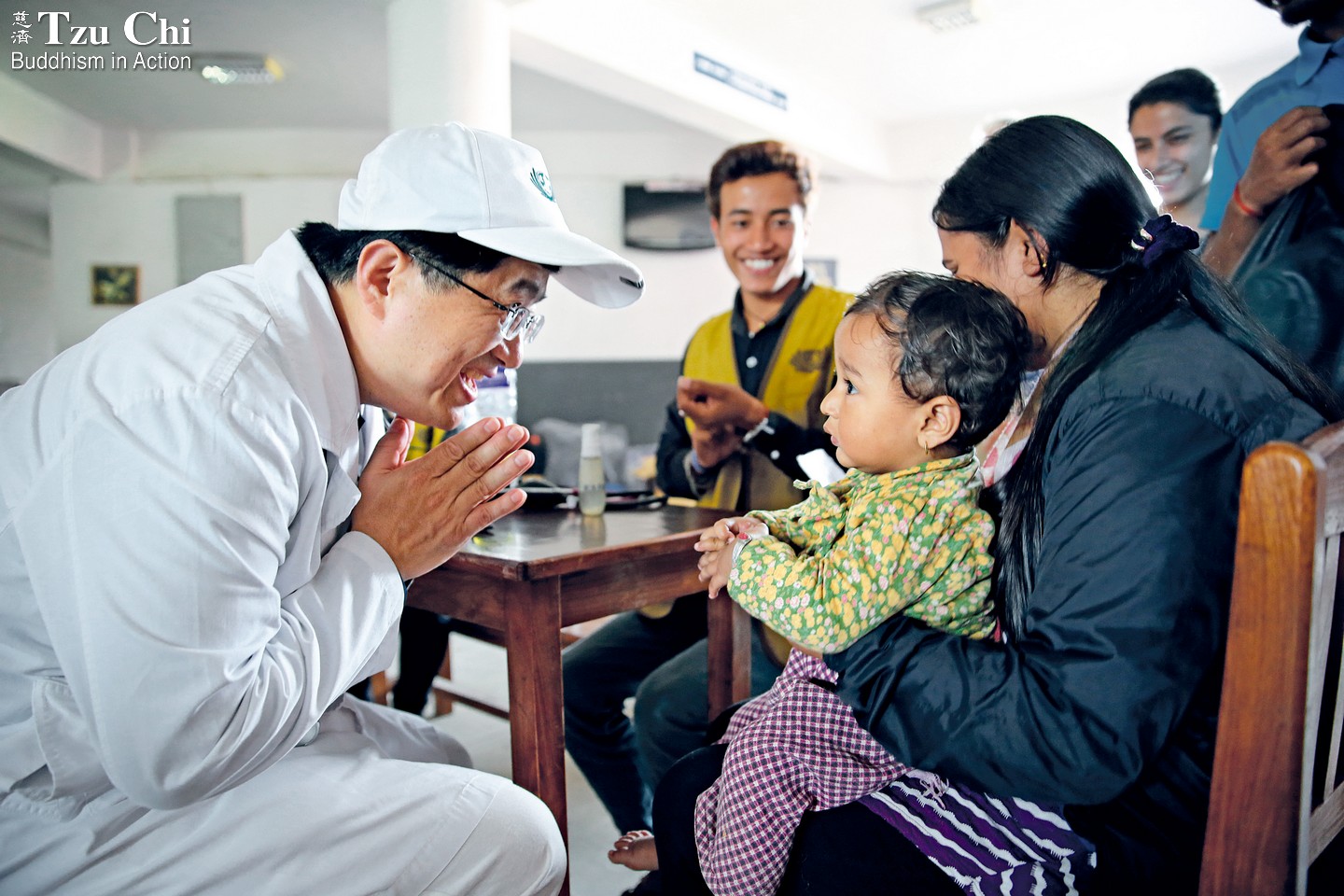
Lin interacts with a young patient at a Tzu Chi free clinic in Nepal, held in response to the devastating earthquake in 2015. Ye Jin-hong
Lin sees an elderly patient in rural Cambodia in March 2019. Zhuo Xiu-yin
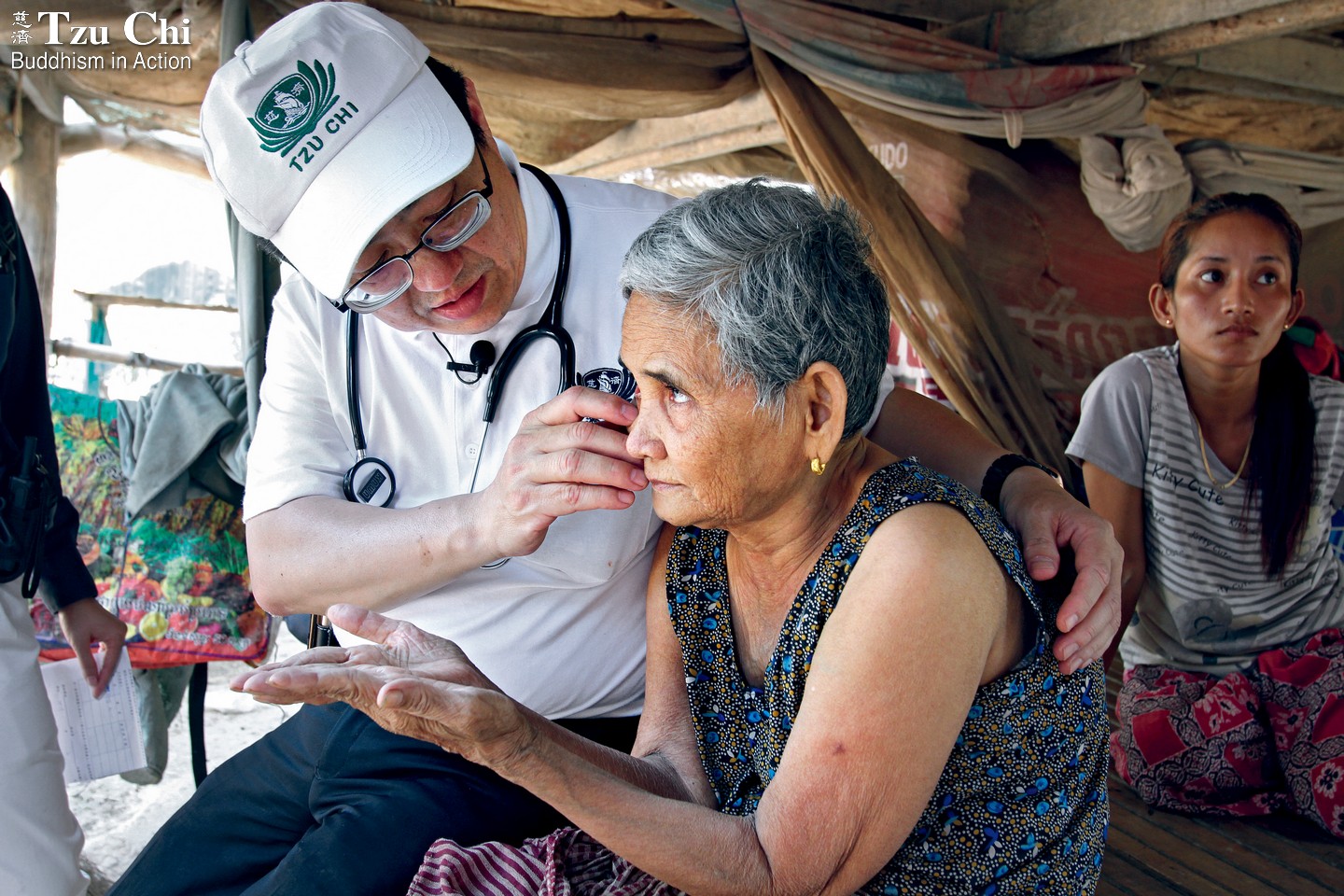
Be the difference
Dr. Lin Chin-lon, now the CEO of Tzu Chi’s medical mission, was the superintendent of Dalin Tzu Chi Hospital when Lin Ming-nan first joined. He asked Lin Ming-nan at that time to assist with community health screenings, which provided Lin the opportunity to apply his expertise in preventive medicine and fully embrace his ideals.
Lin recalled attending the annual International Conference on Health Promoting Hospitals and Health Services in Europe in 2007. Discussions at the conference emphasized that while hospitals are traditionally viewed as places for treating illness, they should also align with the World Health Organization’s (WHO) 1986 call for hospitals to promote health. This perspective corresponded with Dr. Lin Chin-lon’s ideals for preventive medicine and echoed the ancient Chinese medical text Huangdi Neijing, which states, “The superior doctor prevents disease, the mediocre doctor attends to impending disease, and the inferior doctor treats actual disease.” The goal is not only to help the public prevent illness but also to create a healthcare environment that minimizes the occurrence of disease.
Back then, Lin Chin-lon also assigned Lin Ming-nan the task of researching the link between vegetarianism and health. Leading by example, Lin Ming-nan became a vegetarian. He also took on the role of president of the Taiwan Vegetarian Nutrition Society. This laid a solid foundation for him to promote vegetarianism on behalf of Tzu Chi at international platforms, such as the United Nations Climate Change Conference (known as COP, short for Conference of the Parties).
Lin Ming-nan has attended six UN Climate Change Conferences over the years. In 2015, just two weeks before the Paris summit (COP21), a terrorist attack struck Paris, but not even that could deter him, and he attended anyway. He was the only hospital representative from Taiwan invited to attend. During a side meeting, he shared the achievements of Tzu Chi’s environmental mission, which began in 1990 in response to Master Cheng Yen’s call to engage in recycling. Lin also presented on the relationship between vegetarianism and the environment, explaining how dietary habits impact climate change and highlighting Tzu Chi’s efforts to promote vegetarianism and healthy eating. “Change the world by starting with your diet!” he urged.
He remembers being deeply moved when the Master’s portrait appeared on the big screen during his presentation at the COP. He knew that each presentation could inspire more people to recognize the benefits of vegetarianism and help extend Tzu Chi’s spirit to a wider audience. Since joining the foundation, Lin has steadfastly brought Tzu Chi’s love and care for Mother Earth to the international stage, allowing the world to witness Master Cheng Yen’s and the foundation’s efforts in this respect.
Two key concepts from Lin Ming-nan’s international speeches have struck a chord with many. The first, “one action, two effects,” underscores that a vegetarian diet benefits both personal health and the environment. While many recognize the health benefits of a vegetarian diet, such a diet also contributes to environmental health by reducing methane emissions from meat production, which exacerbate the greenhouse effect. Lin is convinced that promoting this concept is crucial, as greater understanding leads to a larger collective impact.
The second concept is derived from the Sutra of Innumerable Meanings, which describes how from one seed, hundreds of thousands grow, and from each of those, hundreds of thousands more arise, continuing infinitely. Lin explains that Master Cheng Yen represents the “one” who brings everyone together in Tzu Chi. “Without that initial ‘one,’ there would be no ‘us’ willing to contribute to slowing global warming,” he said. “Start with yourself; commit to one vegetarian meal a day or one vegetarian day a week. Tzu Chi’s strength is Buddhism in action, but it all begins with that ‘one.’” Lin Ming-nan’s mission is to inspire others to become that “one,” fostering infinite positive impact from a single source.
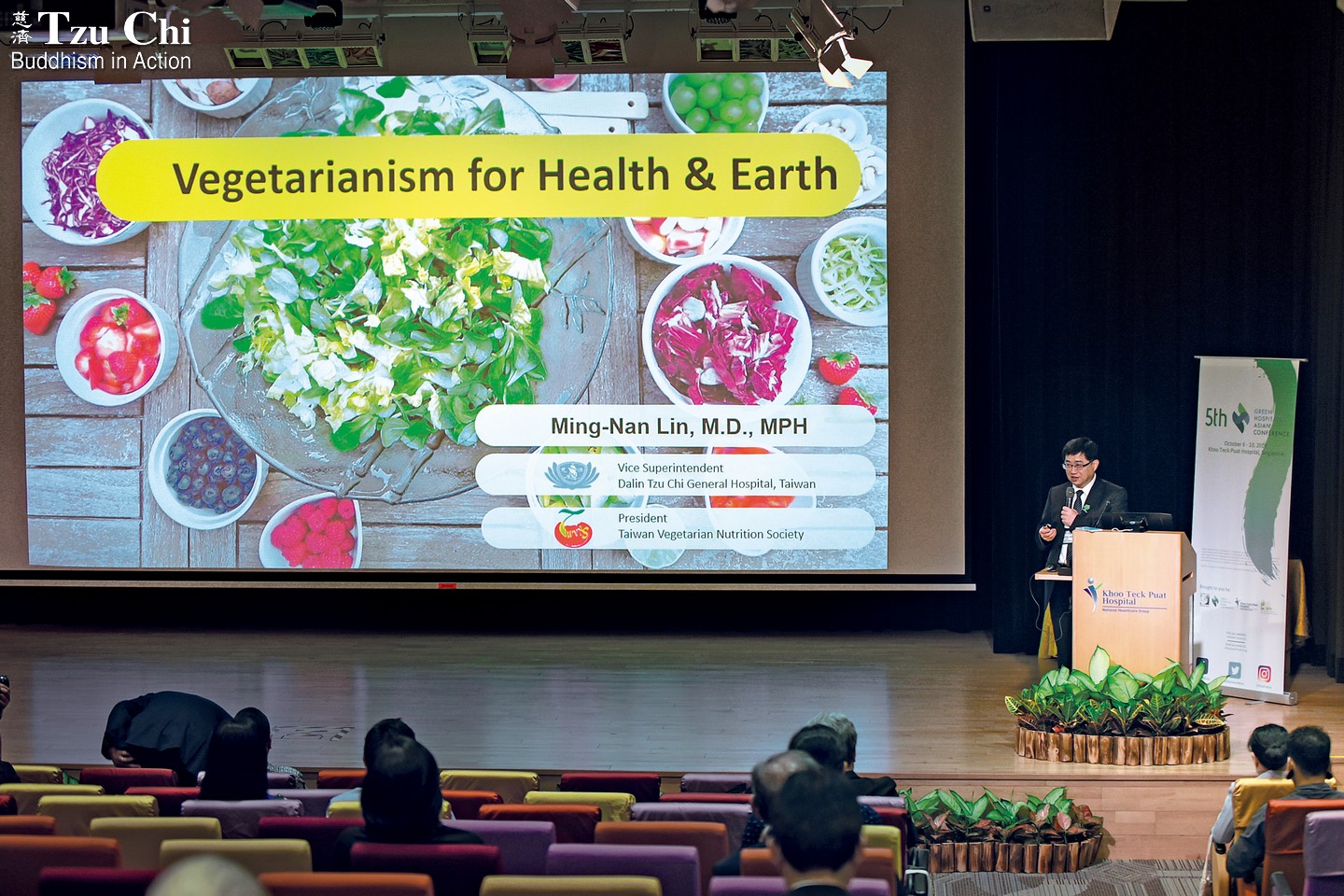
Lin has long shared his research on vegetarianism at international events. He is pictured here speaking on the topic at the Green Hospitals Asian Conference held in Singapore in 2019. Zeng Mei-zhen
Guarding life, health, and love
Once a sprawling expanse of sugarcane fields, Dalin Tzu Chi Hospital has, through the dedicated efforts of its staff, become an international benchmark for Health Promoting Hospitals over the past two decades. Since 2006, the hospital has participated in the International Conference on Health Promoting Hospitals and Health Services. In 2012, it was honored with the inaugural Outstanding Fulfillment of WHO Health Promoting Hospital Standards award.
The hospital’s achievements extend beyond this recognition. In 2020, it received an award from Taiwan’s Health Promotion Administration for its global advocacy of green hospital practices. In 2022, Lin Ming-nan represented the hospital at the 45th World Hospital Congress in Dubai, where he received the bronze award in the Ashikaga-Nikken Excellence Award for Green Hospitals. Notably, Dalin Tzu Chi Hospital was also the first in Taiwan to pledge its commitment to the UN’s 2050 net-zero emissions goal.
Lin Ming-nan has been a key contributor in these accomplishments. In recognition of his contributions to health promotion and environmental sustainability, he was honored in 2023 with the Taiwan Medical Contribution Award by the Taiwan Medical Association. Lin attributed the award to the collective efforts of the hospital staff, emphasizing, “We are not just disease treaters; we are healthcare professionals committed to protecting life, health, and love.”
From the early stages of his career, Lin Ming-nan has been committed to preventive medicine, gradually expanding his mission to include vegetarianism and environmental stewardship. Just as he fought to save that young man in the ER all those years ago, Dr. Lin continues to fight—now on a global stage—to protect life, health, and the environment. His unwavering dedication reflects Master Cheng Yen’s compassionate vow to safeguard both life and the Earth, guiding his ongoing journey and impact.



